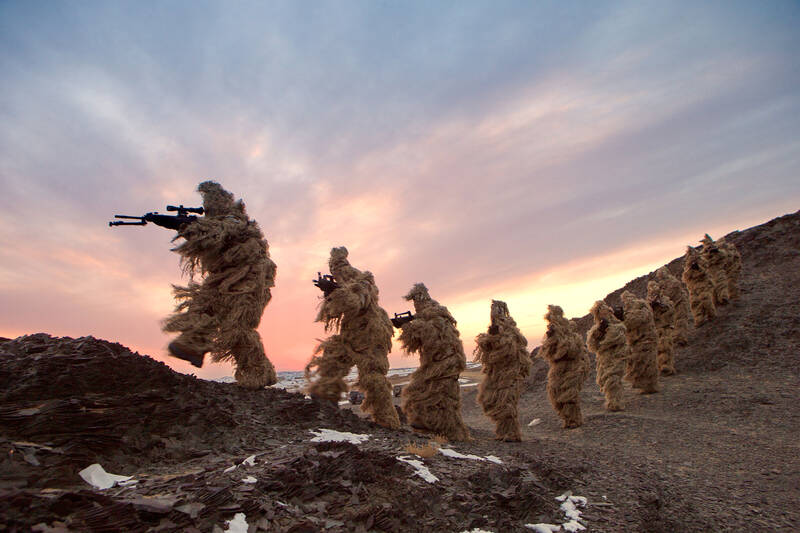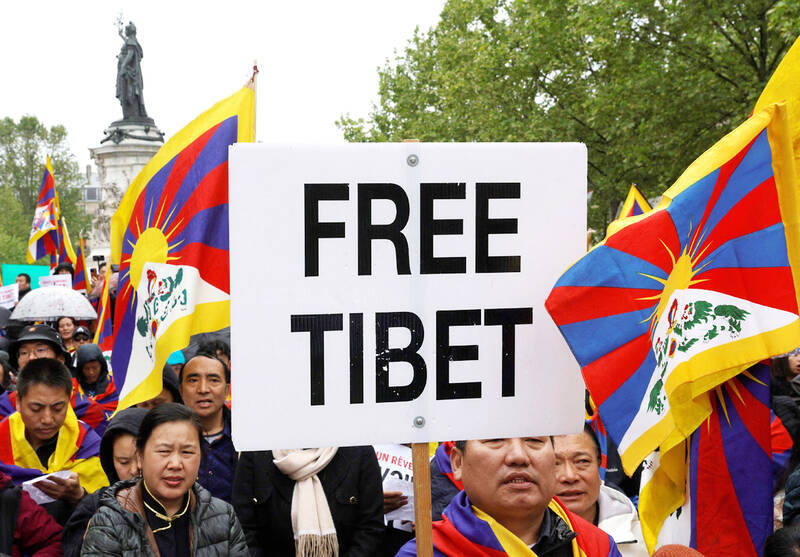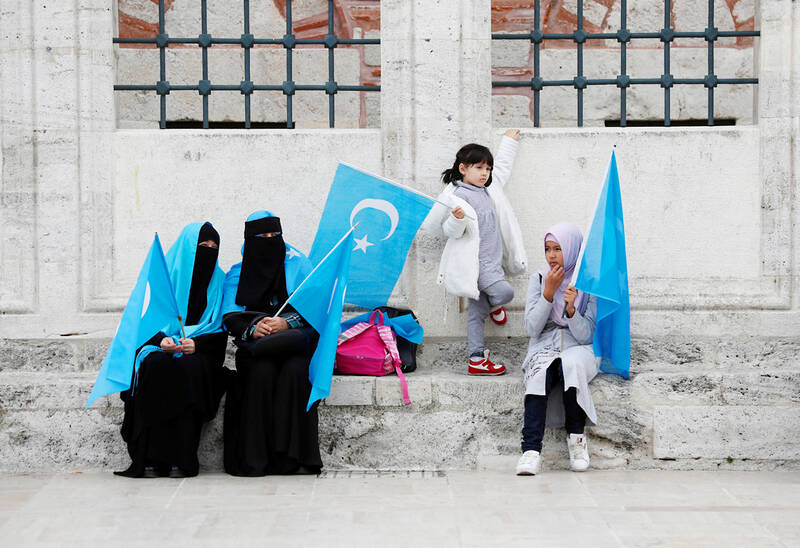A quarter of the world’s countries have engaged in transnational repression — targeting political exiles abroad to silence dissent — in the past decade, new research reveals.
The Washington DC-based non-profit organization Freedom House has documented 1,219 incidents carried out by 48 governments across 103 countries, from 2014 to last year.
However, a smaller number of countries account for the vast majority of all documented physical attacks on dissidents, with China the most frequent offender, responsible for 272 incidents, or 22 percent of recorded cases. Russia, Turkey and Egypt also rank among the worst perpetrators.

Photo: Reuters
High-profile incidents of transnational repression include the 2018 murder of journalist Jamal Khashoggi by a hit squad at Saudi Arabia’s consulate in Istanbul. The Russian president, Vladimir Putin, has targeted his foes in the UK, including the 2006 radiation poisoning of the Russian dissident Alexander Litvinenko. This was followed by a string of more than a dozen other suspicious deaths of Russians on British soil that are also suspected of being tied to the Kremlin.
Transnational repression is the state-led targeting of refugees, dissidents and ordinary citizens living in exile. It involves the use of electronic surveillance, physical assault, intimidation and threats against family members to silence criticism.
“This happens inside democracies,” said Yana Gorokhovskaia, research director of Freedom House. “Every year, we record cases in places like the United States, Canada, the UK, France, Germany and Sweden. That would probably surprise people because I think there’s an assumption that there’s a level of protection and that autocrats can’t reach into democracies.”

Photo: AFP
Iran is also featured in the top 10 perpetrators, with 47 cases logged over the timeframe of the research. Several of these campaigns have been publicly exposed in recent years.
In 2023, journalists at the BBC Persian news outlet were targeted with offensive messages and threats of sexual assault. In March last year, a presenter for Iran International, a Farsi-language news channel, was stabbed outside his home in Wimbledon, south London.
Muslims bear the heaviest burden of transnational repression, accounting for 64 percent of targeted incidents worldwide.

Photo: Reuters
The Uighurs, a mostly Muslim ethnic group from northwest China that are the target of widespread crimes against humanity within the country, are subjected to sustained monitoring, threats and policing by the Chinese authorities, according to the research.
“Uighurs don’t have to be activists to be targeted,” said Gorokhovskaia. “It’s not that censoring themselves would solve this problem for them. It’s because their whole group is viewed as a threat, and so that’s why they’re being targeted.”
In 2022 a spyware campaign targeting Uighurs by posing as Android apps, including messaging services, was discovered by cybersecurity experts. Chinese students living abroad, including in the UK, have also reported being watched and followed.

Photo: AFP
China has been accused of operating secret police stations around the world to monitor and repress opponents of the ruling Communist party. In 2023, US authorities discovered an illegal Chinese police station operating from an office in New York. Beijing had also targeted Tibetans and Hongkongers, said Gorokhovskaia.
“We’re struggling with the magnitude of what the People’s Republic of China is doing. It’s everywhere, on campuses. It’s through social media and online communication. It’s threats against people’s families. China has also made a concerted effort to expand extradition agreements all around the world,” Gorokhovskaia said.
Journalists are among those most at risk of repression campaigns, frequently facing cross-border intimidation as authoritarian governments seek to silence critical reporting. Since 2014, at least 26 governments have orchestrated 124 incidents of transnational repression against exiled journalists, highlighting the growing threat to press freedom on a global scale.
Freedom House documents cases using publicly available information that can be externally confirmed, such as media reports, NGO reports, reports by the UN and other information based on private reporting and civil society activism. Most cases go unreported, however, it says, as targets are scared into silence.
“The purpose of transnational repression is to silence criticism, to scare people and stop whatever activism they’re engaged in,” said Gorokhovskaia. “I don’t think people are reporting what’s happening to them. They’re choosing to censor, if to ensure their safety or the safety of their families.”

Jacques Poissant’s suffering stopped the day he asked his daughter if it would be “cowardly to ask to be helped to die.” The retired Canadian insurance adviser was 93, and “was wasting away” after a long battle with prostate cancer. “He no longer had any zest for life,” Josee Poissant said. Last year her mother made the same choice at 96 when she realized she would not be getting out of hospital. She died surrounded by her children and their partners listening to the music she loved. “She was at peace. She sang until she went to sleep.” Josee Poissant remembers it as a beautiful

Before the last section of the round-the-island railway was electrified, one old blue train still chugged back and forth between Pingtung County’s Fangliao (枋寮) and Taitung (台東) stations once a day. It was so slow, was so hot (it had no air conditioning) and covered such a short distance, that the low fare still failed to attract many riders. This relic of the past was finally retired when the South Link Line was fully electrified on Dec. 23, 2020. A wave of nostalgia surrounded the termination of the Ordinary Train service, as these train carriages had been in use for decades

Lori Sepich smoked for years and sometimes skipped taking her blood pressure medicine. But she never thought she’d have a heart attack. The possibility “just wasn’t registering with me,” said the 64-year-old from Memphis, Tennessee, who suffered two of them 13 years apart. She’s far from alone. More than 60 million women in the US live with cardiovascular disease, which includes heart disease as well as stroke, heart failure and atrial fibrillation. And despite the myth that heart attacks mostly strike men, women are vulnerable too. Overall in the US, 1 in 5 women dies of cardiovascular disease each year, 37,000 of them

March 2 to March 8 Gunfire rang out along the shore of the frontline island of Lieyu (烈嶼) on a foggy afternoon on March 7, 1987. By the time it was over, about 20 unarmed Vietnamese refugees — men, women, elderly and children — were dead. They were hastily buried, followed by decades of silence. Months later, opposition politicians and journalists tried to uncover what had happened, but conflicting accounts only deepened the confusion. One version suggested that government troops had mistakenly killed their own operatives attempting to return home from Vietnam. The military maintained that the